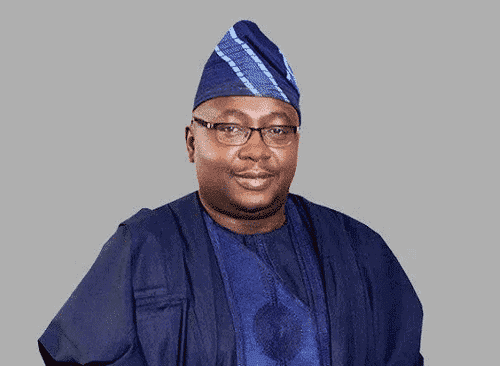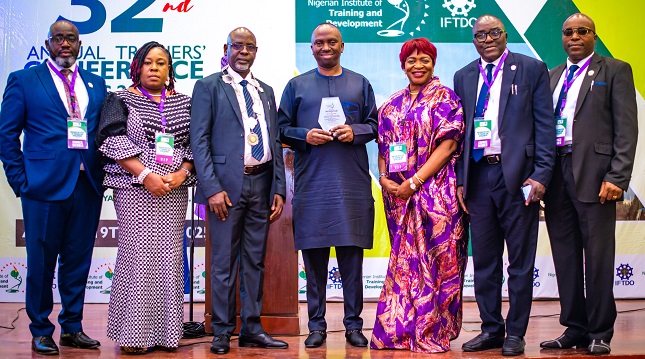News
PwC Report Reveals Brain Exports Presents New Optimal Development Path for Nigeria

Exporting Brain Capital to the global market will put Nigeria on the path to become a developed nation in record time. This is according to a new report by leading professional services firm, PwC Nigeria which analyses the best development path for the country.

After significantly evaluating relevant trends impacting today’s global business landscape and Nigeria’s unique circumstances as well as her position in the world today, the report titled Nigerian Brain Exports: The Optimal Path to Growing the Nigerian Economy’ recommends placing Nigerians in high-end Global Value Chains (GVCs) as the best path forward.
Brain export occurs when a Nigerian physically in Nigeria is inserted into global value chains and exchanges their brain capital for foreign currency which is then remitted to the country where the talent is physically located.
With such a large population that has an average age of 19 years, Nigeria according to PwC has significant Brain Capital advantage, especially considering the ageing population in countries such as Germany, Japan, Italy and the United States. It is estimated that the worldwide working-age population will see a 10% decline by 2060.
Japan in particular tops this list with 28% of its population above 65 and Italy comes second with 23%. In contrast, only 2.7% of the Nigerian population is above 65 which means Nigeria is strategically positioned to supply labour to the global market, thus presenting a strong comparative advantage.
Andrew S. Nevin(PhD), Partner & Chief Economist, PwC Nigeria, said: “Nigeria can transition from a developing to a developed nation within 10 to 20 years. To achieve this however, the country must seek and follow a path different from the traditional development path.
“We believe that the traditional strategy for development is not the most efficient path to improve the quality of life for Nigerians. It takes too long to deliver the expected benefits and Nigeria has not been successful in following this path. Most developed countries adopted the traditional path, but it required significant financial investments spread over a long period. Unlike these countries, Nigeria lacks the finances and cannot afford to waste time.
Given the times we live in, with advancements in research with technology and changes in the ways of working, there is a new optimal development path, one that is strengthened by changing circumstances and Nigeria’s unique assets and attributes. That path is one where Nigeria exports Brain Capital into higher value-added global services markets.”
With case studies of India and Kenya and a few local examples of companies already exporting Brain Capital from Nigeria and actively participating in the GVC’s, the report created a plausible scenario in which Nigeria captures 17% of the global programming and software development jobs. The earnings that will accrue to Nigerians performing these jobs is about $50 billion.
Based on the market size and the growth potential, Nigeria should have a target of two million remote workers inserted into GVCs within ten years. This number the report reckons would drive growth in other sectors of the economy through the increased purchasing power of the people inserted into the GVC.
According to the report, it is essential that the talent plugged into GVCs are not in a few selected locations but adequately distributed across the country to ensure prosperity for the nation.
Importantly, the report opines that Nigeria needs to start treating education as an infrastructure for development, not a social service, especially digital education, as screen-based interactions have become as fundamental as reading and writing.
The report acknowledged that it might be complex for the government to tax Brain Export workers at the moment. But it noted that the advantages outweigh that concern. With increased Brain Exports, burdens such as extreme poverty and high unemployment would lessen, and the government would also gain indirect tax benefits, like Value Added Tax.
News
AfDB, Aerosense Ink Agreement to Propel Drone Adoption in Africa

The African Development Bank (AfDB) and Aerosense Inc, a Japanese drone manufacturer, have inked an agreement to expand cooperation and initiatives in drone technology in Africa.

According to the AfDB, representatives from both organisations signed a Letter of Intent late last week on the sidelines of the ninth Tokyo International Conference on African Development in Yokohama, Japan.
The agreement was signed by Solomon Quaynor, AfDB’s vice president for private sector, infrastructure, and industrialisation, and Kohtaro Sabe, Aerosense’s president and CEO.
In June, the AfDB Sustainable Road Maintenance Program for Africa issued a request for proposals, and the company was chosen.
The agreement formalises a relationship of mutual cooperation, assistance, information and knowledge sharing between the two institutions, as well as the exploration of co-financing and deal opportunities and appropriate coordination of actions between them and their respective teams, with a focus on the promotion of sustainable infrastructure solutions in Africa, according to the bank.
In addition, the AfDB will assist collaboration with the public sector, lead awareness-raising initiatives, support capacity building for local partners, and investigate potential debt (and/or equity) financing support for drone deployment projects.
Aerosense will conduct demand studies for drone solutions in specific African markets, as well as technical feasibility studies for drone application, taking into account local geographical factors, and investigate potential deployment options based on positive feasibility study results.
“The program is a bold response to Africa’s growing infrastructure challenges. By partnering with Aerosense, we will not only promote efficient road management but also consider promoting other unique solutions such as disaster management, river/flooding control, agricultural sensing, and medical equipment delivery,” said Quaynor.
For Sabe, the project is about leveraging multinational technological solutions to address African challenges.
He said: “It is a great honour to serve the people in Africa with our Japanese technology for enhancing their quality of life. We are looking forward to collaborating with AfDB to build a better future together in a concrete manner.”
News
Nigeria Taps $190M JICA Loan to Power Underserved Communities

Nigeria is seeking a $190 million renewable energy loan backed by the Japan International Cooperation Agency (JICA), according to Adebayo Adelabu, minister of power.

Minister Adebayo-Adelabu
In a statement released by the ministry on Saturday, Adelabu disclosed the plan during the 9th Tokyo International Conference on African Development (TICAD 9) in Yokohama, Japan, where the Nigerian delegation led by President Bola Tinubu held high-level discussions on power, infrastructure, and industrial transformation.
Adelabu said the facility is aimed at scaling distributed renewable energy solutions across underserved communities. “This builds on the recently launched $750 million World Bank Distributed Access through Renewable Energy Scale-up (DARES) programme under the Mission 300 Compact, which aims to bring clean and reliable electricity to more than 17 million Nigerians,” the ministry said.
The minister also held talks with Japanese corporations including Toshiba, Hitachi, Japan’s transmission and distribution corporation, and energy exchange corporations. Discussions focused on strengthening transmission infrastructure, improving operational efficiency, and cutting system losses.
The ministry said these engagements build on recent Federal Executive Council approvals for counterpart funding of N19.08 billion to unlock a $238 million loan from JICA. The loan will finance the expansion of the national grid, including the construction of over 200km of new 330kV and 132kV double circuit lines, six new substations, and extensions to existing facilities.
Three substations funded through a $32 million JICA grant—located in Apo (FCT), Keffi (Nasarawa), and Apapa (Lagos)—are also set for commissioning, a move expected to boost supply reliability for households, industries, and business hubs, including the Lagos Port.
Speaking during a panel session themed “HICKARE Africa: Harnessing Innovation, Co-creation, and Knowledge for Accessible and Resilient Energy for Africa”, Adelabu highlighted Nigeria’s energy gap, noting that only 55–60 percent of the population currently has access to electricity, much of which is unreliable.
He outlined the government’s approach to expand grid access in urban areas while accelerating off-grid solutions such as solar mini-grids and standalone systems in rural and peri-urban communities. He pointed to challenges including limited access to affordable capital, high costs for rural households, and the under-utilisation of productive-use equipment.
Despite these hurdles, the minister reaffirmed the government’s commitment to reforms through supportive policies, private-sector collaboration, and increased local manufacturing of renewable energy components.
Adelabu commended JICA and the Japanese government for their “long-standing support” to Nigeria’s power sector, praising their contributions to infrastructure, training, technical studies, and financing. He expressed optimism for deeper partnerships between both countries in driving Nigeria’s energy transition.
News
Banigbe, T2 CEO says Nigeria’s Growth Hinges on Learning, Innovation, and Afrocentric Content

Obafemi Banigbe, chief executive officer of T2, has stressed that Nigeria’s long-term economic transformation depends on continuous upskilling, digital learning, and workforce adaptability.

Speaking as Special Guest at the 32nd Annual Trainers’ Conference (ATC 2025) of the Nigerian Institute of Training and Development (NITAD), held recently at the Shehu Musa Yar’Adua Centre, Abuja, Banigbe warned that without deliberate investment in human capital and technology-driven innovation, the nation risks lagging behind in a rapidly evolving global economy.
Drawing from personal reflections, practical insights, and a forward-looking vision, Banigbe urged Nigerians to reimagine approaches to learning, work, and growth in order to build a prosperous, inclusive, and innovation-led society.
He emphasized that the traditional model of “learning once and working forever” is obsolete.
“With Nigeria projected to become the world’s third most populous nation by 2050, and 70 percent of its citizens under 30, the need for continuous upskilling, digital learning, and adaptability is not optional, it is existential,” he stated.
Banigbe underscored the importance of democratizing access to digital tools, ensuring that every Nigerian child has the same opportunities as peers in developed economies.
He called for the creation of Afrocentric educational content, including culturally relevant cartoons, to help children learn science, mathematics, and history through familiar cultural references rather than foreign identities that disconnect them from their environment.
He also urged a national shift away from a culture that prizes certificates and training hours to one that rewards competence, innovation, and problem-solving.
He envisioned a civil service and workforce driven by solutions rather than processes, stressing that while artificial intelligence may analyze and automate, it cannot dream, uphold ethics, or create new nations, a reminder of the enduring human advantage.
Banigbe further encouraged adoption of cost-effective training models such as online platforms, virtual cohorts, and open-source learning, while acknowledging the continued value of global exposure where local resources fall short.
During an interactive question and answer session, he addressed concerns around affordability, accessibility, and the role of self-driven digital education in shaping Nigeria’s future-ready workforce.
He assured participants that T2 itself is on a path of transformation, committed to delivering world-class services as a proudly Nigerian brand.
In recognition of his contribution to national dialogue and thought leadership, the President of NITAD, James Bulus, presented Banigbe with an Award of Excellence.

 E-Financial3 days ago
E-Financial3 days agoFBNQuest Merchant Bank Facilitates Landmark ₦5Bn Commercial Paper Programme for Accion Microfinance Bank

 E-Business3 days ago
E-Business3 days agoNDPC Begins Probe of Banks, Others for Data Breaches

 Telecom3 days ago
Telecom3 days agoDigital Realty Commits to Africa’s Digital Transformation @ Launch of LKK2 Data Center

 E-Financial3 days ago
E-Financial3 days agoUBA to Deepen Financial Inclusion, Boost Savings’ Culture with Super Savers’ Promo

 Telecom3 days ago
Telecom3 days agoIntel–U.S. Partnership Reshapes Semiconductor Landscape with Historic Equity Agreement

 E-Financial3 days ago
E-Financial3 days agoFidelity Bank Resumes Intl Transactions on Naira Debit Cards

 Telecom3 days ago
Telecom3 days agoNITDA Alerts Nigerians to eSIM Security Flaw Deployed to Hijack Devices Worldwide

 E-Financial3 days ago
E-Financial3 days agoNigeria Leads Africa in Stablecoin Adoption with $22Bn in Transactions

























